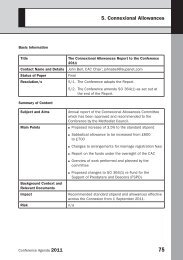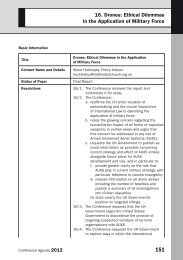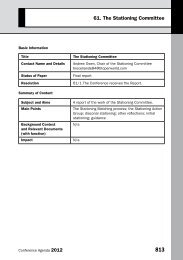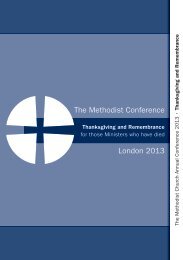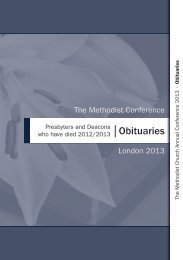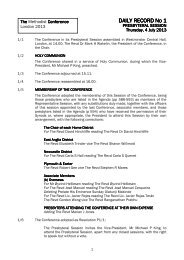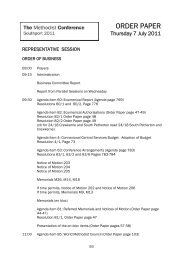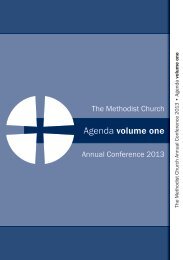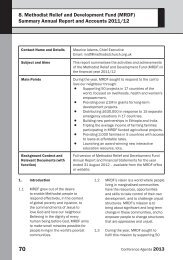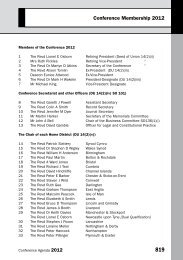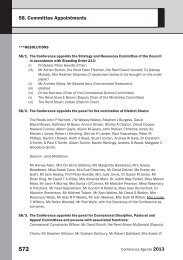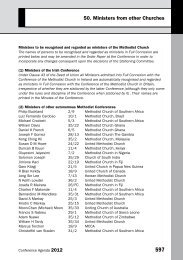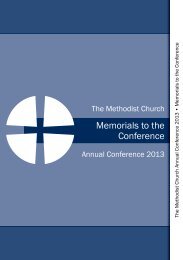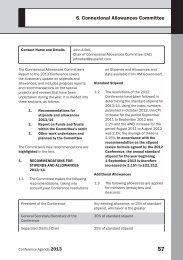Agenda Volume 3 - Methodist Conference
Agenda Volume 3 - Methodist Conference
Agenda Volume 3 - Methodist Conference
Create successful ePaper yourself
Turn your PDF publications into a flip-book with our unique Google optimized e-Paper software.
60. Referred Memorials and Notices of Motion<br />
charged with proposing any changes to the <strong>Conference</strong> of 2012, and the avoidance of<br />
suspicion that the vote is affected by self-interest.<br />
6. The general rule of law is that a person in a fiduciary position is not allowed to put<br />
himself or herself in a position where his or her duty and interest conflict. That is the<br />
general principle which underlies provisions such as SO 919, governing how conflicts<br />
of interest are to be dealt with. A similar principle applies where different duties may<br />
conflict. In both cases, however, the principle does not apply if informed consent<br />
has been given to the fiduciary’s being in such a position. This exception is often of<br />
relevance in cases where a person is appointed to one trustee body because of his<br />
or her involvement in a fiduciary capacity with another body. In broad terms, since the<br />
second body has chosen to make the appointment, it has consented to its appointee’s<br />
acting (as he or she must) in the best interests of the first body.<br />
7. In deciding on the level of minimum stipends and other allowances, members of the<br />
<strong>Conference</strong> are not acting strictly as trustees, since they are not dealing with property<br />
held by the <strong>Conference</strong>. Nor are they strictly in a fiduciary position equivalent to that<br />
of company directors determining how the company’s assets are to be applied. It<br />
therefore seems that the general rule of law does not strictly apply.<br />
8. Even supposing that it did, however, the <strong>Methodist</strong> Church has chosen, through the<br />
Deed of Union and Standing Orders, to establish a governing body which, as a matter of<br />
principle, is composed of a mixture of ministers and lay people all of whom are regarded<br />
as having an essential role to play in the oversight of the Church. It is inherent in<br />
that structure that there may be circumstances in which the interests of presbyters or<br />
deacons or lay people may be affected by the decisions that have to be made. On the<br />
particular question of connexional allowances, the views of lay people may be affected<br />
by issues of local resources; it cannot be assumed that they will necessarily be free<br />
from any conscious or unconscious bias. In the view of the Law and Polity Committee,<br />
the Church has chosen a particular form of governance structure and has accepted the<br />
inevitable consequence that members of the <strong>Conference</strong> have to be trusted to vote<br />
according to their consciences and not from motives of self-interest.<br />
9. This committee therefore concludes that there is no legal objection to the continuance<br />
of the present practice whereby presbyters and deacons may vote on matters relating<br />
to stipends and allowances.<br />
***RESOLUTION<br />
60/2. The <strong>Conference</strong> adopts this report as its reply to M24(2008).<br />
<strong>Conference</strong> <strong>Agenda</strong> 2012 811



